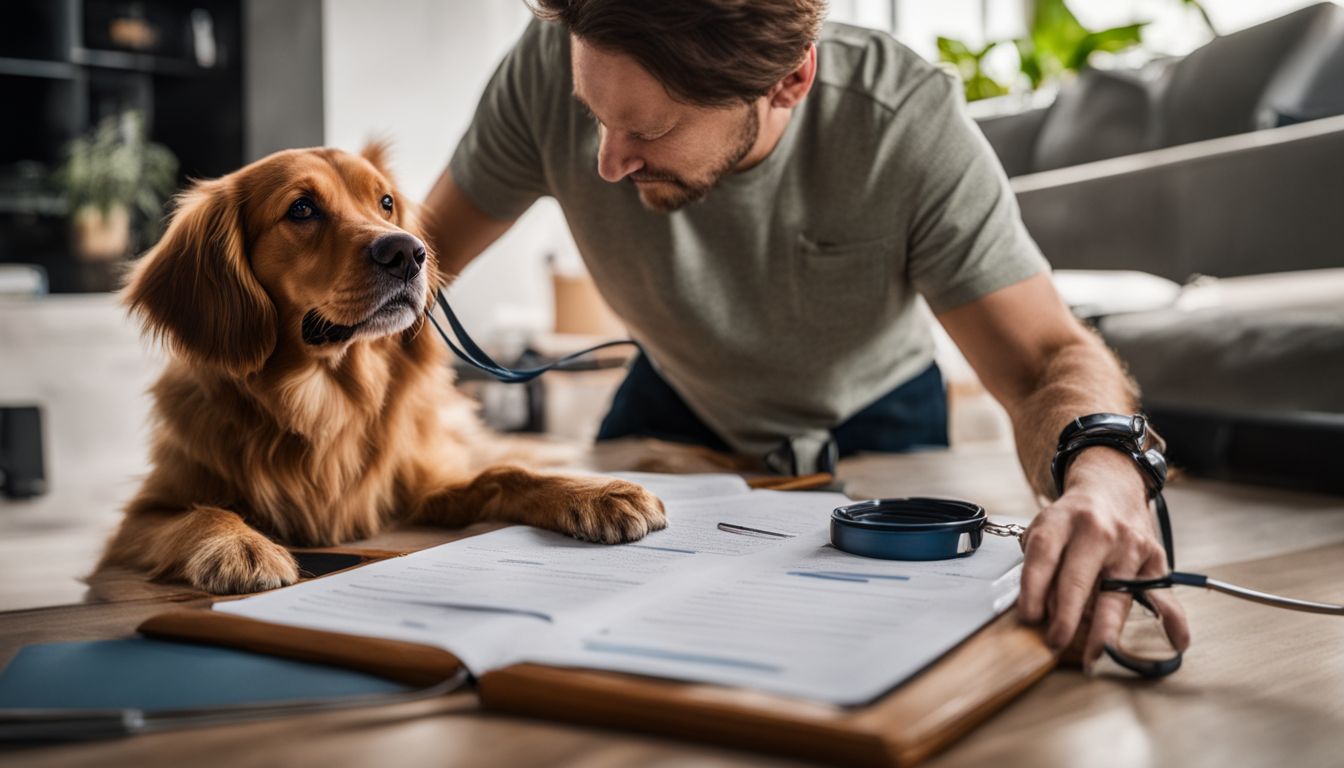How Much Does It Cost To Own A Dog? A Comprehensive Guide
Thinking of bringing a furry friend into your home? It’s vital to know how much it might cost you. This guide breaks down what it really costs to own a dog, from initial adoption or breeder fees right through to their everyday needs like food and vet checkups.
Stay with us for the full scoop on managing those costs without breaking the bank.
The Cost of Owning a Dog

Owning a dog comes with initial costs such as adoption fees, breeder expenses, and necessary supplies. Additionally, ongoing care costs including veterinary visits, vaccinations, and food are essential for the well-being of your pet.
Initial costs (adoption/breeder fees, supplies)
Getting a dog starts with some big expenses. These include costs from breeders or shelters and things your new pet will need.
- Buying a puppy from a good breeder can cost you £500-£1500. The price changes based on the dog’s breed.
- Choosing to adopt a dog means giving a donation to rescue centres. This fee helps care for other animals and usually includes the first vaccinations.
- Initial shopping for your puppy needs careful planning. You’ll need a collar, leash, and food bowls right away.
- A comfy bed is essential for your dog’s rest. Prices vary depending on the size and quality you choose.
- Nail clippers and brushes keep your pet looking neat and feeling good.
- High-quality dog food keeps your canine happy and healthy. Expect to spend between £20 to £60 every month on meals and treats.
- Vaccinations are crucial in your pet’s first year, adding to the initial costs.
- Castrating or neutering your dog can be a one-off expense of about £280, which can prevent future health issues.
- Flea and tick treatment starts early too, with monthly costs around £40, while worm treatment adds an extra £10 per month.
- Microchipping your pet offers security and peace of mind, marking another important initial cost.
These upfront investments prepare you for a great start with your new companion, ensuring they’re healthy, safe, and equipped with all they need.
Ongoing care costs (veterinary visits, vaccinations, food)
Owning a dog means regular visits to the vet and keeping their belly full. These costs can quickly add up, so it’s good to know what you’re in for.
- Veterinary Visits: Expect these at least once a year for a check-up. Costs can vary widely but plan on spending around £200-£300 annually if your pet is healthy. This does not include unexpected trips if your dog falls ill or gets injured.
- Vaccinations: Puppies need several rounds of jabs in their first year, costing about £100-£150. Adult dogs then need annual booster shots that might cost less but are still essential.
- Food: High-quality food is vital for your dog’s health, setting you back between $20 to $60 every month depending on the size and diet of your dog.
- Preventative Healthcare: This includes treatments for fleas, ticks, and heartworms which are crucial for keeping your pet healthy. Monthly flea and tick treatment can reach up to £40, while worming treatments add another £10 monthly.
- Pet Insurance: While optional, it can be a lifesaver during emergencies or illnesses. Prices vary based on coverage but expect anywhere from £10 to over £50 per month.
- Grooming: Costs depend on the breed but anticipate spending from £30 for a basic groom to over £60 for breeds needing more care like Golden Retrievers or Cockapoos.
- Training: Essential for obedience and behaviour management, classes or one-on-one sessions range significantly in price from around £50 to several hundred pounds.
- Dental Cleanings: Often overlooked, dental health is as vital for dogs as it is for humans with cleanings recommended yearly at around £200-£300.
- End-of-life care: No one likes thinking about this too early, yet planning can manage costs better when the time comes.
By understanding these ongoing expenses, owners can budget effectively ensuring they give their furry friend the best life possible without unforeseen financial strains.
Optional expenses (pet insurance, grooming, training)
Owning a dog brings joy and provides companionship. It also involves some costs that are not always mandatory but can greatly improve your dog’s life.
- Pet insurance helps cover unexpected vet bills. This might include accidents, illnesses, or emergency care which can cost hundreds to thousands of pounds without it.
- Regular grooming keeps your dog looking their best and prevents health issues like matted fur or overgrown nails. Groomer services vary but expect to pay for baths, haircuts, nail trimming, and ear cleaning.
- Training classes teach your dog good manners and can prevent problem behaviours. Prices for group sessions or individual lessons vary depending on the trainer’s experience and the course length.
- Some breeds need special foods or dietary supplements due to their size or health needs, adding to the monthly food expenses.
- Day care services provide socialisation and exercise for dogs when owners are busy or away at work; this is especially useful in busy urban areas.
- Special treatments such as flea, tick prevention, and worming treatments keep your dog healthy but add monthly costs.
- Microchipping is a one-off expense that ensures your dog can be identified if they get lost.
- End-of-life care, though a difficult topic, includes costs associated with saying goodbye to a pet in the most dignified way possible.
Each of these optional expenses contributes to the overall wellbeing of your dog but also increases the cost of ownership. Choosing which services are right for you and your pet will depend on your lifestyle, budget, and the specific needs of your dog.
End-of-life considerations
Planning for the final stages of a pet’s life is tough but necessary. End-of-life care can include costs for vet visits and possibly euthanasia, which might cost quite a bit depending on your location and the services chosen.
Budgeting for this will ensure you’re prepared financially.
Choosing cremation or burial will also affect your budget. Prices vary widely, so it’s good to look into options early on. This helps avoid unexpected expenses during an already difficult time.
Having a plan gives peace of mind not just about the finances, but in honoring your pet’s memory properly.
How Much Does a Dog Cost Over Their Lifetime?

What is the lifetime cost of owning a dog? Learn more about expenses and tips to reduce costs.
Breakdown by breed
Breaking down the cost by breed shows how much you might spend on a dog from their puppy years to adulthood. This depends a lot on the breed’s size, health needs, and lifespan. Some breeds need more care, leading to higher costs. Here’s a glimpse into how breed affects the price of dog ownership:
| Breed | Initial Costs (£) | Annual Care Costs (£) | Lifetime Costs (£) |
|---|---|---|---|
| Small Breeds | 500-1500 | Up to 2000 | 20000-30000 |
| Medium Breeds | 600-1500 | 2000-3000 | 25000-35000 |
| Large Breeds | 700-1500 | 3000-5000 | 30000-50000 |
Small breeds often have lower initial costs but don’t let that fool you. Their lifespan is longer, so the long-term costs add up. Medium breeds strike a balance, not too pricey at the start or in the long run. Large breeds, though, need more food and often have higher vet bills, making them the priciest.
To cut costs, consider adopting from a rescue centre. This way, you pay a donation instead of a high breeder’s fee. Also, look for ways to save on supplies by buying in bulk or choosing cost-effective brands.
Owning a dog is a big financial commitment. Plan ahead and think about all the costs involved. This will help ensure you and your dog have a happy life together without financial stress.
Tips for reducing costs
Owning a dog involves some costs, but there are ways to save money. Following these tips can help reduce the expenses of having a furry friend.
- Choose mixed-breed dogs from rehoming centres instead of buying purebreds from breeders. Mixed-breeds often have fewer health problems, potentially lowering medical expenses.
- Make homemade dog treats rather than buying them. Use vet-approved recipes to ensure they’re healthy.
- Look for affordable veterinary care options such as clinics offered by charities like the ASPCA, which may provide lower-cost vaccinations and spaying or neutering services.
- Buy pet supplies in bulk from retailers or during sales. Items like food and shampoo can be cheaper this way.
- Consider pet insurance to cover unexpected veterinary costs, but compare different policies to find one that fits your budget and needs.
- Train your dog at home using free resources from social media platforms and websites dedicated to dog care instead of pricey training sessions.
- Engage in DIY grooming by learning how to bathe and clip your dog’s nails yourself.
- Share pet-sitting duties with friends or neighbours instead of paying for daycare or a pet sitter.
- Regular preventive health care can avoid bigger bills later on. Keep up with flea, tick, and worm treatments you can administer yourself.
- Use credit cards that offer rewards on purchases to buy dog supplies, then pay off the balance in full each month to avoid interest charges.
Now let’s explore the overall costs of dog ownership in 2024 and see how they compare to previous years.
Overall Costs of Dog Ownership in 2024
Owning a dog in 2024 incurs various expenses, impacted by factors such as breed and location. To delve deeper into the ever-evolving costs of dog ownership, read more about it on our blog.
Comparing costs to previous years
The cost of having a dog has changed over the years. Here is a breakdown comparing the costs to previous years:
| Year | Initial Costs (£) | Ongoing Yearly Costs (£) | Optional Expenses (£) |
|---|---|---|---|
| 2020 | 300-1200 | 1800 | 200-500 |
| 2021 | 350-1300 | 1900 | 250-600 |
| 2022 | 400-1400 | 2000 | 300-700 |
| 2024 (Projected) | 500-1500 | 2000 | 350-800 |
Prices have gone up. Buying a puppy from a breeder now costs between £500 and £1500. The yearly care for a dog stands at around £2000. Feeding a dog costs between $20 to $60 every month. You could spend between $1,000 and $5,225 every year on your dog. On average, a dog owner spends $80-$440 monthly. Additional costs include teeth cleaning, a bed, nail trimmers, and a brush. One-off costs like neutering can hit £280. Monthly treatments for fleas and ticks can add £40, and worm treatments £10 to your expenses. Don’t forget the microchipping fee. Always budget for initial items for a new puppy. This shows a trend of increasing costs in dog ownership over the recent years.
Factors influencing cost (breed, location)
The breed of a dog significantly impacts the overall cost of ownership. Different breeds have varying needs in terms of food, grooming, and healthcare. For instance, larger dogs generally require more food and may be prone to certain health issues, resulting in higher veterinary costs.
Furthermore, location plays a crucial role in determining expenses associated with owning a dog. The cost of living varies across regions, affecting the price of everything from veterinary care to pet supplies.
When considering bringing a furry friend into your home, it’s crucial to account for these factors influencing the total cost. Be mindful that choosing a specific breed and being aware of your local area’s cost dynamics can profoundly impact your budget as you welcome a new companion into your life.
Conclusion
Owning a dog comes with costs. From initial adoption fees to ongoing care expenses, it adds up. High-quality food, veterinary visits, and grooming are regular costs you’ll encounter.
Consider also factoring in training, pet insurance, and end-of-life considerations. Remember to budget for these expenses when considering bringing a new pup into your life!
FAQs
1. How much does it cost to get a dog?
Getting a dog can vary in price. If you adopt, it might be less expensive than buying a breed like a Havanese or Goldendoodle from a breeder.
2. What are the monthly costs of owning a dog?
Each month, you need to pay for food, maybe some grooming, and regular check-ups with the vet to keep your dog healthy.
3. How much will I spend on my dog each year?
Every year, along with food and visits to the vet, remember costs like toys, leashes, and sometimes pet sitting if you go away. It adds up!
4. Do I need to think about special care for my dog?
Yes! Dogs need things like being spayed or neutered and getting microchipped. And don’t forget about their end-of-life care needs.
5. Can unexpected costs come up when owning a dog?
Definitely! Sometimes dogs get sick and need medicine or special visits to the veterinarian that weren’t planned for.
6. Why is it important to know all these costs before getting a dog?
Understanding all these costs helps make sure you’re ready for everything involved in caring for your furry friend throughout their life.

